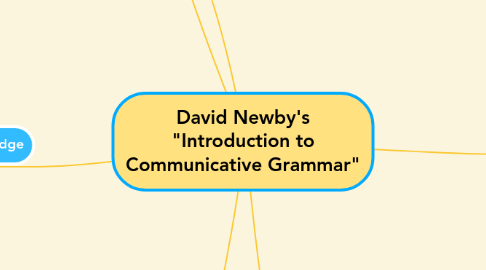David Newby's "Introduction to Communicative Grammar"
by Majda Se

1. Types and Means of acquiring knowledge
1.1. • Declarative → knowledge about fact and things…
1.2. • Explicit → knowledge that is expressed through metalanguage, (such as a grammar rule or explanation)
1.3. • Deductive processing → learners first process metalanguage – e.g. a grammatical rule
1.4. ➢ Procedural → knowledge about to how to preform cognitive activities
1.5. ➢ Implicit → sub- or unconscious knowledge…intuitive and not verbalised
1.6. ➢ Inductive processes → learners are provided with grammar exemplars, on the basis of which they set up hypotheses as to the nature of rules, which underlie the grammar
2. Hypotheses and pedagogical implications of a Cognitive view of learning
2.1. Language learning = concept learning (learning is meaning driven and goal directed)
2.2. Language is embedded in a network of schematic constructs and contexts
2.3. Knowledge of language emerges from language use (competence and performance rather than just knowledge)
2.4. Learning is an active and dynamic process
2.5. Learning a language entails a stagewise progression
3. Having some idea of what happens in the minds of learners when they acquire new information will help considerably when analysing and designing grammar exercises and activities.
4. Providing rather examples than rules!
5. Learning Stanges
5.1. I. Awareness → pupils notice and focus on new grammar
5.2. II. Conceptualisation → pupils ‘understand’ a grammar rule; usually conscious knowledge
5.3. III. Proceduralisation → pupils are able to use grammar in ‘scaffolded’ exercises without a strong conscious focus on rules
5.4. IV. Performance → pupils are able to use grammar in open contexts; focus on the overall message
6. What makes a ‘good’ grammar activity?
6.1. 1. Attention: Learners must attend to input and attention must be maximised in activities.
6.2. 2. Meaning-driven processing: Learners’ memories will be enhanced if their own interpretations of language meaning is at the heart of activities.
6.3. 3. Associations: Learners should be encouraged to associate new items with their existing knowledge.
6.4. 4. Depth of processing: Learners should be given tasks which require them to process language at different and deeper levels.
6.5. 5. Repetition: Learners need multiple contacts with new language.
6.6. 6. Multi-modal processing: Learners should process language through a variety of senses and processing modes, including affective.
6.7. 7. Social learning: Learners must be given opportunities to learn from each other.
6.8. 8. Cognitive needs: Learners will commit themselves to activities more strongly and process information more deeply if cognitive needs are fulfilled
6.9. 9. Affective needs: Learners will commit themselves to activities more strongly if affective needs are fulfilled


